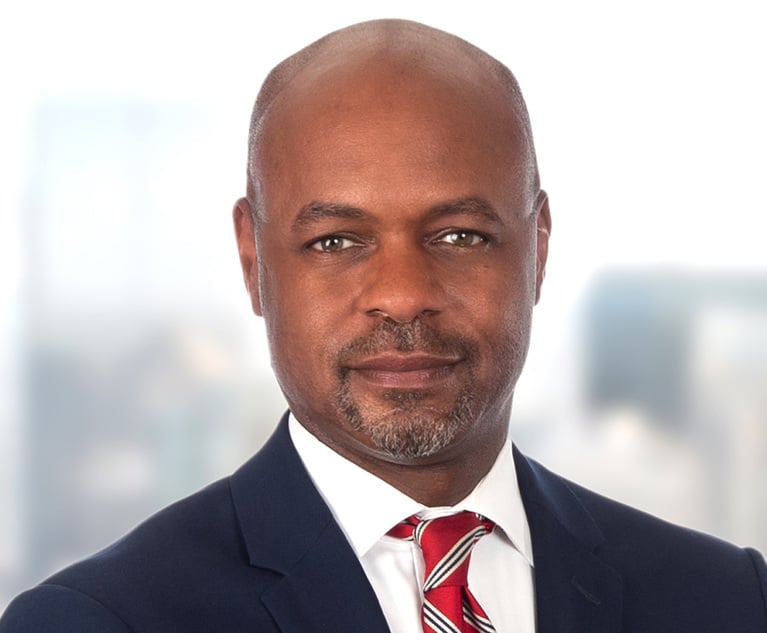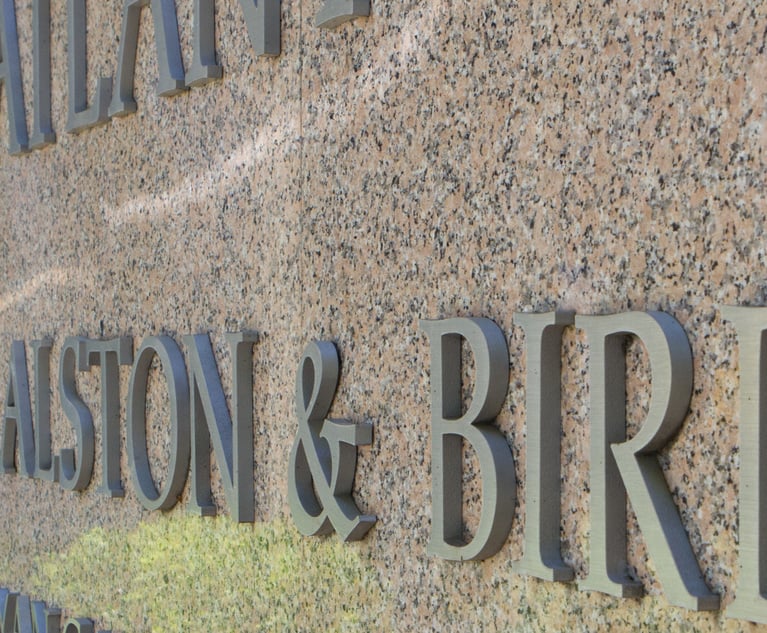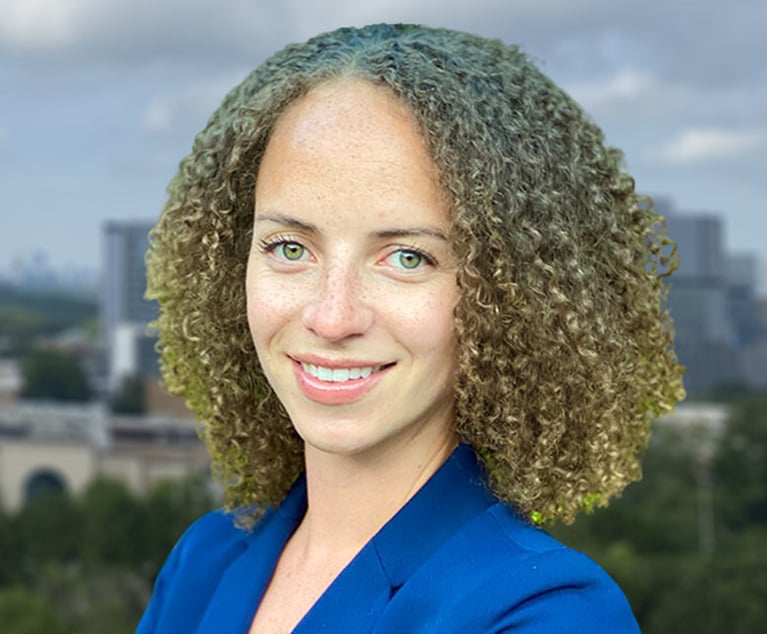 John Hall (left) and Jon Pope. (Courtesy photos)
John Hall (left) and Jon Pope. (Courtesy photos)With Courts Shuttered by COVID-19, Litigators Turn to Settlement
Plaintiffs lawyer Jon Pope and defense specialists John Hall said this is a good time to resolve cases that might have otherwise dragged on or gone to trial.
March 30, 2020 at 04:05 PM
7 minute read
With courts closed and the logistics of filing documents and taking depositions mounting challenges across the board, some litigators are finding the COVID-19 outbreak is a good time to ease up on hardball litigation tactics and talk settlement.
"We're finding that plaintiffs attorneys are reaching out to use this as an opportunity to resolve cases that would normally take months or years, and probably go to trial," said John Hall of defense firm Hall Booth Smith, which boasts about 250 lawyers in eight states.
One unnamed plaintiffs firm with a number of general liability and long term care cases called to discuss moving them to resolution, said Hall, who is in turn letting opposing counsel know his firm is ready to make a deal.
Hall said civil litigation is unlikely to return to normal anytime soon. In addition to largely shuttered courthouses, "people also need to understand that there's going to be a huge increase in bankruptcies, credit impact. … Realistically, you're looking at six months to a year for any trials to start up, and, when they do, criminal trials will have priority," Hall said.
Jon Pope of Hasty Pope, who also is executive vice president of the Georgia Trial Lawyers Association, agreed and said his firm is one that's taken up Hall's offer.
"I'm going to give John Hall credit. He posted a message saying 'now is the time to resolve cases,' and one of the next calls I made was to him [saying] 'I want to take you up on that,'" Pope said.
Pope said difficulties with going to court and scheduling depositions plays a part in the decision, but there's also a need to serve clients' interests.
"You do have certain clients who are in need and you realize, especially in litigation, that the time to get to court may be a long way away," Pope said.
"I was in a mediation in December, and we were fairly close, but things happen. You get on a different case, things get back-burnered. That case resolved today," said Pope on Friday. "I'm not saying we took less or they paid more—we just wanted to use this time wisely."
Hall said legal work in the COVID-19 era has meant fielding lots of calls from clients in the health care industry and employers wondering what they can do to keep themselves safe from legal and viral threats. Insurance coverage questions are common, as well as efforts to understand directives at the state and federal level regarding health care providers.
"From our perspective, there's a big push right now to understand what the Department of Health and Human Services immunity decree means for local providers," said Hall, pointing to the agency's recent declaration granting legal immunity to drugmakers and distributors and licensed health professionals working to fight the disease.
The agency also issued waivers from several provisions of the Health Insurance Portability and Accountability Act for hospitals caring for coronavirus patients, an effort Hall said he hoped states will emulate.
"Gov. [Andrew] Cuomo has provided additional immunity for health care workers in New York," said Hall, issuing an executive order that raises the standard for liability for frontline providers from ordinary to gross negligence.
"We're working with some of our clients to approach governors in other states—including Gov. [Brian] Kemp in Georgia—about providing some of that immunity for health care providers on the frontlines," said Hall, whose firm is headquartered in Atlanta and has an office in New York.
"We're also giving a lot of advice on employment," he said. "If you have somebody and don't have the capacity to employ them, what are you required to do? We're getting folks asking, 'What do I have to provide in terms of benefits? Do I continue paying salaries or start layoffs?'"
Dealing with those issues "is a little bit of a moving target right now, given the stimulus package we're hoping will pass," said Hall, speaking before the legislation was approved Friday.
On the litigation front, Hall said it's too early for many coronavirus-related lawsuits to be filed, "but we have seen a class action in Texas against some insurers seeking coronavirus exceptions to their policies," Hall said.
He noted that many policies already contain such exceptions, as COVID-19 is only one of several strains of the virus to have emerged over the past decade.
As noted on Hall Booth's coronavirus Litigation Blog, there has also been a recent suit in Louisiana against Lloyd's of London seeking a declaration that a New Orleans restaurant's business interruption insurance policy covers losses attributed to the virus and shutdown order by Gov. John Bel Edwards.
"There are going to be a lot of declaratory judgment actions on whether that's excluded. You'll definitely be seeing litigation on that," Hall said.
Pope said he and his colleagues on the plaintiff side are working to see that health care providers are shielded from liability in these difficult times but also want to keep the public safe.
"We've been talking about ways we can help; I know there are concerns about medical malpractice cases, and we always worry about big insurance using this as an opportunity to change the law drastically," Pope said.
"I think one thing we can all agree on is that our medical providers need to be free to provide the best care they can," said Pope. "What we don't want is taking away someone's rights under the Seventh Amendment."
Given the "extraordinary times" that are overwhelming hospitals and stressing the nation's health care system to the limit, Pope said there should be a way to offer protection for caregivers and volunteers.
Pope, who also is GTLA's legislative co-chair, said he's reached out to Kemp's office to discuss easing such standards.
"We're trying to work with the governor to see how we can provide protection for those volunteering; we're talking about adding protections for hospitals and medical providers. For example, some are retirees who've been asked to come back to work," Pope said.
"The legal definition of the standard of care is how similarly qualified practitioners manage care provided under similar conditions," said Pope. "That doesn't change, but these are special circumstances."
Hall said he's also hearing concerns from employers worried that they may face liability for infected workers.
"Another factor is exposure cases, either exposure at work or exposure to someone who was exposed at work," he said. "If that person goes home and infects somebody, was that person acting reasonably? Was the employer acting reasonably?"
Hall said there were many questions from clients in the hospitality industry as to who should be allowed to serve, who should stay away from the public and who should be sent home.
"We refer them to the published guidelines about what the symptoms were, what the reasonable restrictions and behavior is," he said. "That has become less of an issue, given the shutdown of retail and bars and restaurants."
Given the public recognition that those on the front lines are risking their health and that of their families, Hall said he thought there might be a residual benefit for liability defendants once litigation picks back up.
"I do believe the level of response the health care industry has given—professional and compassionate—is going to make a difference once jury trials do get going," he said. "I think there will be an aura of goodwill that will affect non-corona cases."
Read more:
This content has been archived. It is available through our partners, LexisNexis® and Bloomberg Law.
To view this content, please continue to their sites.
Not a Lexis Subscriber?
Subscribe Now
Not a Bloomberg Law Subscriber?
Subscribe Now
NOT FOR REPRINT
© 2024 ALM Global, LLC, All Rights Reserved. Request academic re-use from www.copyright.com. All other uses, submit a request to [email protected]. For more information visit Asset & Logo Licensing.
You Might Like
View All
Georgia Supreme Court Honoring Troutman Pepper Partner, Former Chief Justice
2 minute read

After 2024's Regulatory Tsunami, Financial Services Firms Hope Storm Clouds Break
Law Firms Mentioned
Trending Stories
- 1'Largest Retail Data Breach in History'? Hot Topic and Affiliated Brands Sued for Alleged Failure to Prevent Data Breach Linked to Snowflake Software
- 2Former President of New York State Bar, and the New York Bar Foundation, Dies As He Entered 70th Year as Attorney
- 3Legal Advocates in Uproar Upon Release of Footage Showing CO's Beat Black Inmate Before His Death
- 4Longtime Baker & Hostetler Partner, Former White House Counsel David Rivkin Dies at 68
- 5Court System Seeks Public Comment on E-Filing for Annual Report
Who Got The Work
Michael G. Bongiorno, Andrew Scott Dulberg and Elizabeth E. Driscoll from Wilmer Cutler Pickering Hale and Dorr have stepped in to represent Symbotic Inc., an A.I.-enabled technology platform that focuses on increasing supply chain efficiency, and other defendants in a pending shareholder derivative lawsuit. The case, filed Oct. 2 in Massachusetts District Court by the Brown Law Firm on behalf of Stephen Austen, accuses certain officers and directors of misleading investors in regard to Symbotic's potential for margin growth by failing to disclose that the company was not equipped to timely deploy its systems or manage expenses through project delays. The case, assigned to U.S. District Judge Nathaniel M. Gorton, is 1:24-cv-12522, Austen v. Cohen et al.
Who Got The Work
Edmund Polubinski and Marie Killmond of Davis Polk & Wardwell have entered appearances for data platform software development company MongoDB and other defendants in a pending shareholder derivative lawsuit. The action, filed Oct. 7 in New York Southern District Court by the Brown Law Firm, accuses the company's directors and/or officers of falsely expressing confidence in the company’s restructuring of its sales incentive plan and downplaying the severity of decreases in its upfront commitments. The case is 1:24-cv-07594, Roy v. Ittycheria et al.
Who Got The Work
Amy O. Bruchs and Kurt F. Ellison of Michael Best & Friedrich have entered appearances for Epic Systems Corp. in a pending employment discrimination lawsuit. The suit was filed Sept. 7 in Wisconsin Western District Court by Levine Eisberner LLC and Siri & Glimstad on behalf of a project manager who claims that he was wrongfully terminated after applying for a religious exemption to the defendant's COVID-19 vaccine mandate. The case, assigned to U.S. Magistrate Judge Anita Marie Boor, is 3:24-cv-00630, Secker, Nathan v. Epic Systems Corporation.
Who Got The Work
David X. Sullivan, Thomas J. Finn and Gregory A. Hall from McCarter & English have entered appearances for Sunrun Installation Services in a pending civil rights lawsuit. The complaint was filed Sept. 4 in Connecticut District Court by attorney Robert M. Berke on behalf of former employee George Edward Steins, who was arrested and charged with employing an unregistered home improvement salesperson. The complaint alleges that had Sunrun informed the Connecticut Department of Consumer Protection that the plaintiff's employment had ended in 2017 and that he no longer held Sunrun's home improvement contractor license, he would not have been hit with charges, which were dismissed in May 2024. The case, assigned to U.S. District Judge Jeffrey A. Meyer, is 3:24-cv-01423, Steins v. Sunrun, Inc. et al.
Who Got The Work
Greenberg Traurig shareholder Joshua L. Raskin has entered an appearance for boohoo.com UK Ltd. in a pending patent infringement lawsuit. The suit, filed Sept. 3 in Texas Eastern District Court by Rozier Hardt McDonough on behalf of Alto Dynamics, asserts five patents related to an online shopping platform. The case, assigned to U.S. District Judge Rodney Gilstrap, is 2:24-cv-00719, Alto Dynamics, LLC v. boohoo.com UK Limited.
Featured Firms
Law Offices of Gary Martin Hays & Associates, P.C.
(470) 294-1674
Law Offices of Mark E. Salomone
(857) 444-6468
Smith & Hassler
(713) 739-1250







